Ethan Calleja and Danielle Kettlewell will be Australia’s first ever mixed duet to compete at the FINA World Championships in Gwangju, South Korea, in July. Kettlewell, or ‘DK’, a 2016 Olympian who has spent most of her life living and breathing synchro, and Calleja, a former competitive swimmer and a beginner in synchro, have only been training together for a little over a year in Perth.
Despite the odds, the 26-year-old and 19-year-old have been working tremendously hard to make up for their differences, to pave the way for mixed duets in their country, and to encourage more boys and men to join as the mixed duet event has been growing around the world.
We chatted with this new, dynamic, and passionate pair to talk about their journey so far as trailblazers for Australia, what it’s like swimming together, and how they would like to see mixed duets grow worldwide.
Inside Synchro: You two are now swimming together but have completely different paths. Can you talk about you different careers and how you got started in synchro?
Ethan Calleja: I have a very different story about how I got into the sport. I had a competitive swimming career that spanned over 13 years, and I took it to my absolute limit. I still loved it, but I knew I couldn’t go further in it. I was kind of finishing that up at the end of 2017, and by that point, I had been coaching synchro for just over a year.
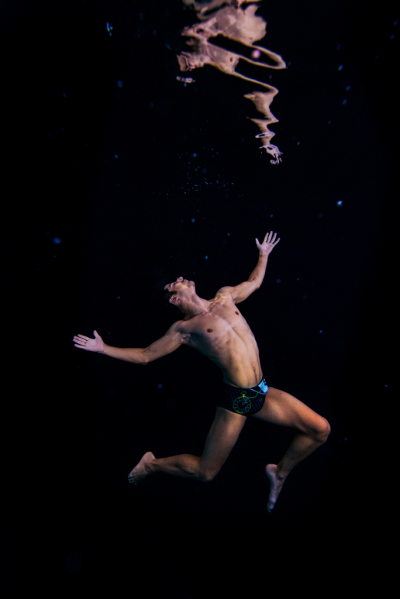
I first got into the water with my coach Briana Preiss who offered to help me practice the simple skills that I was coaching. I knew what was the right way to do things, but due to my lack of experience in synchro, I didn’t know how the athletes got to that point. So, I got into the water about one hour a week after some of my swimming sessions, adding to my 18-hour training weeks to help me coach better. As I started progressing and understanding the skills more, I found myself enjoying what I was doing.
I had planned to retire from swimming and competitive sports to focus on my studies and other things in life. I was approached by Briana about my plans and what possibilities there could be with synchro. So, I retired from swimming and then practically got invited to join and train to see how much I could progress in a short amount of time. I loved being in the water, and honestly I love a challenge, testing myself and trying something. Since January last year, I’ve been pretty much taking on a full load of training for synchro!
Danielle Kettlewell: It’s funny too because I obviously have been swimming a lot longer than he has. He’s 19, and I’ve been swimming for 18 years, so almost as long as he’s been alive (laughs)!
I started back in 2001 in Canada. I did gymnastics and swimming growing up, and my mom just thought that synchro would be a good option for me. After a few years, I fell in love with the sport. I pursued it all throughout high school, but I was never really that good in my opinion. I was one of those girls who loved synchro, but I think it was easy to say at the time that I was never the one that you would pick going anywhere. Within figures, I wasn’t even in the top 100, so I wasn’t the best by any means, and I’ll be the first to say that. But I loved, loved the sport so much.
At 18, I retired because in a lot of countries, there is kind of this weird gap where it’s either try out for the senior national team, which I wasn’t going to be good enough for, or you are kind of done. It was unfortunate, but I focused on my university studies, I got into coaching, and I eventually got into masters synchro. I kept swimming, but I got a concussion from doing masters synchro and when I was concussed, I had to drop out of university.
The day after my 21st birthday, I got this phenomenal opportunity. My parents are Aussie so I have dual citizenship. Just through the connections of the synchro world, myself and a friend of mine got asked if we wanted to come to Australia and try out for the Australian national team in the hopes of making the team for the Olympics! It just seemed insane to me because I never thought that I was really that good. I never thought I would really make anything of myself in this sport, but I had this unbelievable opportunity, so I said I’d rather try and fail than always wonder what if.
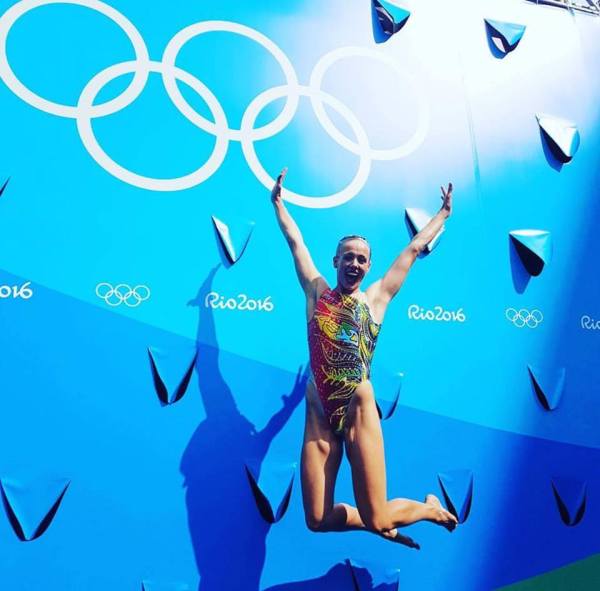
So I moved to Australia, I worked really hard and I was lucky enough to make the Olympic team in 2016. Then I kept swimming and went to Budapest in 2017 [for the world championships]. I took the year off in 2018, and I thought I was going to walk away and be done.
But at the same time, I was at nationals last year, not swimming, and I realized I also really wanted to keep going because I was excited about Ethan then and seeing him try to go for the world championships. We had coached together so I knew him. I thought about how cool it was that Australia was going to have its first mixed duet, and that I would love to be there as an athlete to watch him swim and watch that happen. Everyone then was trying to figure out who his duet partner was going to be. Our coach came up to me and just went “I just have a proposition for you. How do you feel about being his duet partner?” I didn’t even believe her (laughs)!
Then, I started thinking about it. Ethan and I get along really well and I just thought… what an amazing opportunity for Australia. We are trying to push that boundary, we are trying to make it more of a popular sport and get more respect in the country. I just thought of what a great opportunity it was for me to give back, and to be part of something pretty amazing in the sport that I love. And that kind of started us on our journey!
IS: Ethan, how did you get into coaching synchro in the first place?
EC: I was looking for a job and I had prior coaching experience back with my swim squad. My coach told me about a coaching course for synchro, giving me the impression that I was helping with how to swim better, which in fact wasn’t the case! It was a three-day course, and I thought to myself why not stick to it and see how it goes. I got into coaching straight away, and the club loved how I was with the kids and also my experiences with swimming. So they asked if I wanted to start working for the club, and the rest is history!
IS: What made both of you stick with the sport?
EC: I thought I was done with high level sports for a while… Well, for ever (laughs). I had gone to nationals and done decently well, but I was not the most gifted at it, so even at my best season I wasn’t the best, but I was very happy. But yes, I thought I really was done. Six weeks later, I picked up synchro, and it was the not knowing what was going to happen that got me into it. I also think the massive challenge of it, of it being so hard and so different was really something that kept me going.
I’m the type of person who will stick to something and make sure I’m putting as much effort into it as I can. And I’ve always been in love with the water and [synchro] sorta felt like a different way of being in the water. Although I’m 19 and it’s not the right age to start a new sport (laughs), it’s been amazing seeing myself grow, and knowing I’m doing something well. This is encouraging to just keep going.
It was also really exciting to get to do something I haven’t done before and this is different. I’m trying to leave a legacy, and I really want to make sure that with this opportunity, I’m going to snatch it and do the best I can with it. This is something I never thought I’d do, and it’s really opened me up to new things and put me in position that I would have never been in before.
DK: And it’s so much more interesting than swimming!
EC: Yes !
IS: And what about you Danielle, why did you stick with synchro for nearly 19 years?
DK: Oh, I love synchro… Oh, there are so many reasons! There is just something magical about our sport. We literally do something that defies the laws of physics. And the ability to do something that not many people can do, it’s just phenomenal. That’s one of the reasons I love it, and also the ability to push yourself past the limit which you think you’ve reached.
I also love the balance of having that artistic side and being able to express yourself in the water, but also having that technical side, so you use both sides of your brain. You’re thinking all the time, but you’re also moving, and it’s just a beautiful way to express yourself in the water, and do a sport, and be fit, and be with a team!
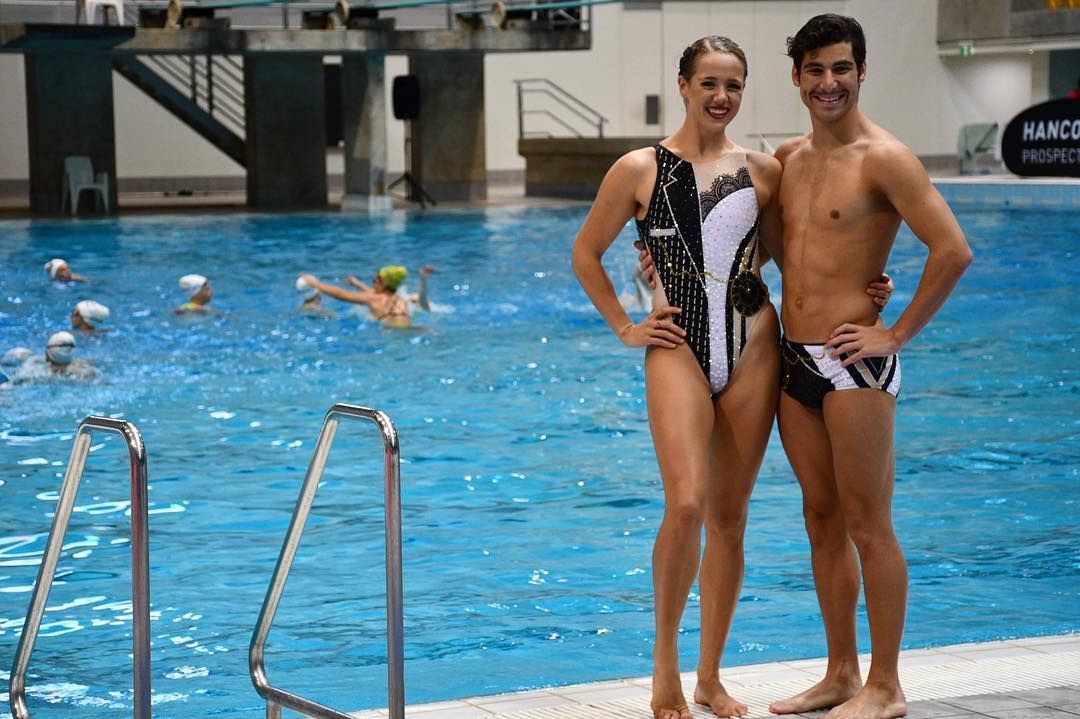
IS: You went into it a little bit, but how is it swimming together with such different backgrounds?
EC: It’s very different. I’ve been coaching for about two years now, and I had a lot of experience coaching for swimming, so I was in my comfort zone in the actual coaching side of it. It was just that synchro was a whole new ballgame for me, so it was good to have DK pretty much working with me as a coach just to really help me with those different things. We already respected each other on a coaching level, and then as soon as we found out that we were partners it just transitioned really well.
It grew from there, and I think as time has gone on and with working with each other, we have really realized how to play off each other, seeing what each other’s strengths and weaknesses are, how to deal with each other, etc. It’s really been eye-opening, but also really good because my experience is really based on the individual. I was kind of always in my own head, not having to worry about someone else, and not trusting anybody else.
DK: It’s been interesting because it’s not often you put somebody who has been in the sport for their lifetime with a beginner! We take this very seriously, and it has been a very interesting learning process that just reminds me and makes me appreciate how hard synchro really is with seeing him learn it.
It’s also been massive for my own patience! We’ve really been working on our communication, which has been hard because he’s been an individual athlete, and I’ve been in a team of 12. It’s all about realizing that when you are in a team, you have a lot of people to bounce off of if you have a bad day or if you’re annoyed with someone, you can kinda just let it go and chat with someone else… But it’s just me and him, so we have to get along (laughs)!
I’ve also tried to work on not being so bossy because I know a lot about synchro and I’m trying to help him, but Ethan was a swimmer for many, many years so he actually does have an athlete’s brain. I’m trying to give him the benefit of the doubt a lot of times, and he does kind of understand the mental aspect. It’s been a really interesting journey for me. I feel like I’ve done so much in my career, and this is so different from all of that.
IS: So, what does training look like for you two?
EC: As competition season is stepping up, we stepped up our training too. We have about four to five sessions in the water, and then on top of that we have gym sessions as well as ballet and rhythmic gymnastics which we do on Saturday mornings. It is a good help for me because I’m not the most flexible person!
DK: (laughs)
EC: Yeah (chuckles)… It’s really good to have that. Depending on the weeks, we are just doing what we can, so our training plans change all the time depending on what pool space we have, our own schedules, and stuff like that. We have learned to be very adaptable to what we are doing.
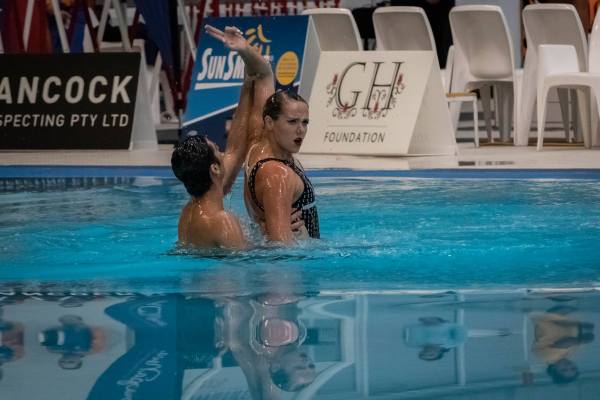 After a lot of our sessions, I’m completely mentally frazzled, but then I’m like “Damn, that was good.” You just feel so accomplished, and having those moments more often than not, it really makes you realize what you’re doing and why you’re doing it.
After a lot of our sessions, I’m completely mentally frazzled, but then I’m like “Damn, that was good.” You just feel so accomplished, and having those moments more often than not, it really makes you realize what you’re doing and why you’re doing it.
DK: Ethan was saying to me “I only had to do four things for 10 years! There are so many things in a routine!” Sometimes I’m looking at him and ask him if he’s okay, but he’s just trying to process all the counts and everything. When you think about it, you forget what it takes…When my leg goes up, it just points and extends. But for him, he has to go “Point my foot! Extend my knee! Move!” And he has to think about all these things actively where he just had to do the four strokes for years.
We have also had some really funny experiences too because I have never swam with a boy so some stuff happens, like kicking him in the crotch or wondering why he can’t do a certain move and he just goes “…I have something there you know” (laughs)! Once he asked me if he should shave his chest, and I didn’t know! It has never been a question I’ve thought about!
IS: It’s a fair question!
EC: Yes! I’m used to shaving with swimming, and I’m used to having that stereotype of being waxed. But there are different things in this sport, we have to think of that, of how my hair is going to look like, etc. With swimming, it’s just down the block, and then you’re in the water, no one really sees or stares at you as much, but in synchro everything is presentation. It’s kinda cool. It’s different and weird, but we love it!
IS: How do you see the future of mixed duets in Australia?
EC: Both of us have really made it evident that we just want to make sure we are setting the sport up in the best way we can. That, as much as we want to succeed, our goal is to really be a representation of what the sport can be and make a great foundation for it. It goes beyond us, and it’s really important for us that we are representing the sport well but also mixed duets. We are not taking it easy, we are not doing it just for fun, or just doing it because we love it.
It’s something that’s bigger than us, and that’s one thing that’s amazing. It’s kind of frightening in some ways, but it really makes us feel humble in what we are doing and in the fact that we have an opportunity to pave the way for the country. We understand that there are people that came before us and there are people coming after us, so we are just trying to make our mark as much as we can. With mixed duets, it’s so different from anything else in the sport, and we just want to encourage differences and show a different side of what the sport can be.
DK: Yes. Ethan is very level-headed for a 19 year old male, and he is a really great representation of what male synchronized swimmers can be. He’s a big role model, so having that attention at the top can give us the power to fuel future generations of synchro swimmers, men and women, boys and girls in this sport.
Australia is an interesting country, because it has such a strong swimming representation and the world knows Australian swimmers are great, but we aren’t as strong in synchro. I think that comes from an underlying undertone of misogynistic culture here. I mean, the way that synchro has been represented in the past being a female-only sport has not given it the respect that it deserves unfortunately. Having a male come into it in this weird way gives the media this reason to respect us more. I don’t agree with it, but at the same time it gives us the opportunity to change the way people think about it and make people realize it’s a real sport. And that it’s the most amazing, most difficult and hardest sport in the world. We have the opportunity to inspire future generations of boys and girls in Australia to get into it.
Obviously we are not a top country in the world, but we are trying to push ourselves forward. It’s just changing those perceptions and stereotypes, paving the path, and realizing that by being on the national team, we are making the changes for the girls and boys who are just starting. Hopefully by the time that they get up to the national team level, the whole country will be at a different level.
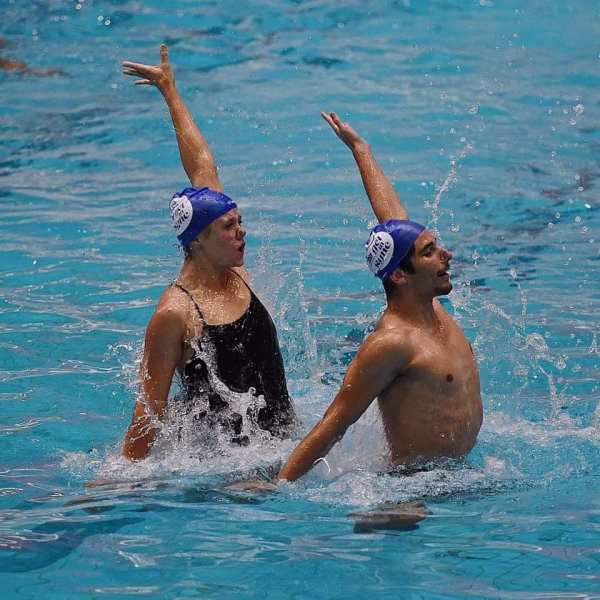
I also believe there is no sport in the world that like synchro is really still at the beginning of its possibilities. Imagine one day, we are going to be seeing a world championships where there are full male teams! Or, I see an Olympics where there is a male component and a female component, male teams, female teams, male duets, female duets, and the possibility of men in a full team doing synchro is so exciting, because just physiologically they can do so much more! Or imagine mixed teams in the future! I don’t think there are many other sports out there that are still at the brink of what is possible. It’s such an exciting time to be part of our sport because who knows what the future is going to hold, but there is just so much possibility. We are just at the beginning.
IS: Speaking of the Olympics, the decision has already been taken for Tokyo to not include mixed duets, and it’s in the talks for Paris 2024. Do you see yourself hanging on until then?
EC: For us now, it’s more just really focusing on this season and worlds. I think it’s too ambitious to think about the Olympics too much especially being in my first year. We found out that just focusing on what we are doing right now this competition season and just being in the present is enough. And anyways, I’m definitely not ready to go to Tokyo even if it were an event (laughs)! For me personally, it’s about paying my dues first and getting into the sport. I’m focusing on being the best I can be to represent the country.
Of course, you want synchro to be taken seriously and you want that mixed duet competition. But even just talking with people, you sort of understand that it’s not that the Olympic Committee doesn’t want men, but it’s more that you have to understand the reasons why. There is not a huge competition of guys right now, so it’s about trying to find what role we can have to try to set the sport up for now. If there’s a competition every year that actually gets a competitive environment, then decisions will get made.
So even if it’s 2024, or 2028, or later, we would know we’ve made an impact in other people going into it, and for us this is more of a goal than just attending. Even though I’d love to attend!
DK: If it becomes an event, I’d love to see Ethan go, but I’m 26 so I’m pretty much a geriatric in synchro. I’m not planning on doing a ‘Gemma Mengual’ (laughs)! I just don’t think I have that in me, coming back at 38 after two children. She’s just on another level!
My plan after worlds is to retire and move on. I’m actually writing a book about my journey to the Olympics, and moving forward in that aspect of my life. But if mixed duets do get to the Olympics, I want to see Ethan there.
It’s kind of beautiful because I’m at the end of my journey and he is at the beginning of his. I’m just trying to give him everything that I’ve learned throughout my years, and years, and years of experience to set him on the best foot, and to propel him forward. And we don’t know if it’s gonna be 2024, fingers crossed, but I want to see Ethan there whenever, so I’m going to do everything I can to make that happen for him.
IS: I can’t wait to read your book! What else do you do outside of the pool?
DK: Well, all of this is pretty much personally funded and out of pocket for the most part. Luckily, Ethan has four jobs! I just finished university after taking nine years total because of all my swimming. I’m working part time as a secretary, so we are just doing the best we can to be able to scramble the money to make it all work.
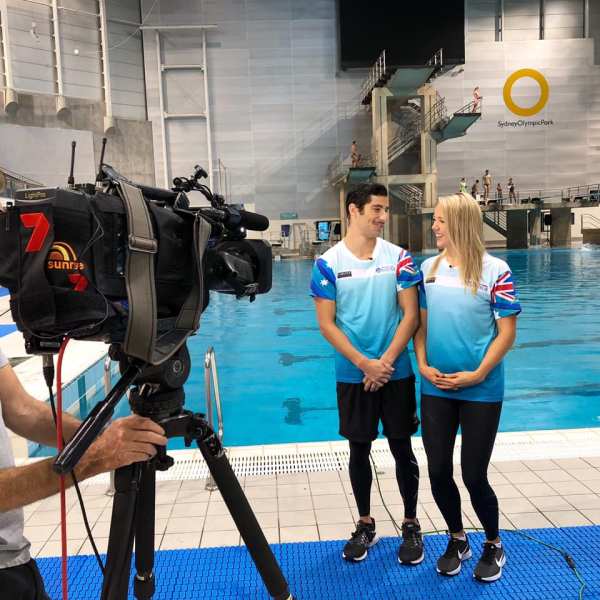
I also love doing public speaking and motivational speaking, so I’m hoping to use the book to build out a platform, share my story, share the power of synchro, and share the power of people going after their dreams and doing something they are passionate about. When people are doing something they love, I think the world is only a better place.
IS: “Luckily” Ethan, you have four jobs! That’s crazy!
EC: Yes (laughs)! I’ve got four or five jobs at the moment to just try to pay for everything! I’m also at university part time this year [for a Bachelor of Commerce in Management], so I’m there for two days and then every other day is just trying to work. Social life isn’t really there, but it’s really good to have all the synchro girls because we always hang out, so at least I get something, but that’s pretty much my life. It’s just non-stop synchro, because it’s working to pay for synchro, then training, and of course studying. It’s a busy life but we love it.
DK: It’s such a frustrating thing that it comes down to money at the end of the day, because I think that shouldn’t be what sport is about. But that’s also why I feel really passionate about doing the best that we can. If we are getting that media attention, then the more people will know, the more attention we will get, the more opportunities we may get to have sponsorships, and we may get more people to join and change the situation.
Unfortunately it’s one of those things where you can’t get better until you get money, but you don’t get money until you get better, so it’s that cycle that we are currently stuck in. I hope that we improve this so the little boys and girls who are starting now, if and when they get on the national team someday, they don’t have to go through the financial struggles that I went through on the national team. Hopefully we can change that for the future.
IS: One final question, is there anybody in this sport that inspires you?
EC: I think everyone looks up to Bill May (laughs)!
DK: Aaaaah, yes !
EC: It astounds me that he’s still technically one of the best, well, he is the best in the world, and I’m just thinking that I’m probably not going to be doing that at 40! I also actually just spoke to Aleksandr Maltsev from Russia; he messaged me a couple of weeks ago and that was really exciting. We just had a 15-minute chat, but it’s really cool to see the support of the community, and those guys who really started when there was pretty much nothing.
[Danielle] and I are fortunate that it’s slowly taking baby steps and we are doing something for our country when it’s a bit more prevalent around the world. They had to go through a lot more than what we have had so far, and they had to do a lot more than us. I’ve seen and read through a lot of things, and it wasn’t so positive for them. I think them going through that and still pushing through is very inspiring to me. I just sort of fan girl and just want to meet them all (laughs)!
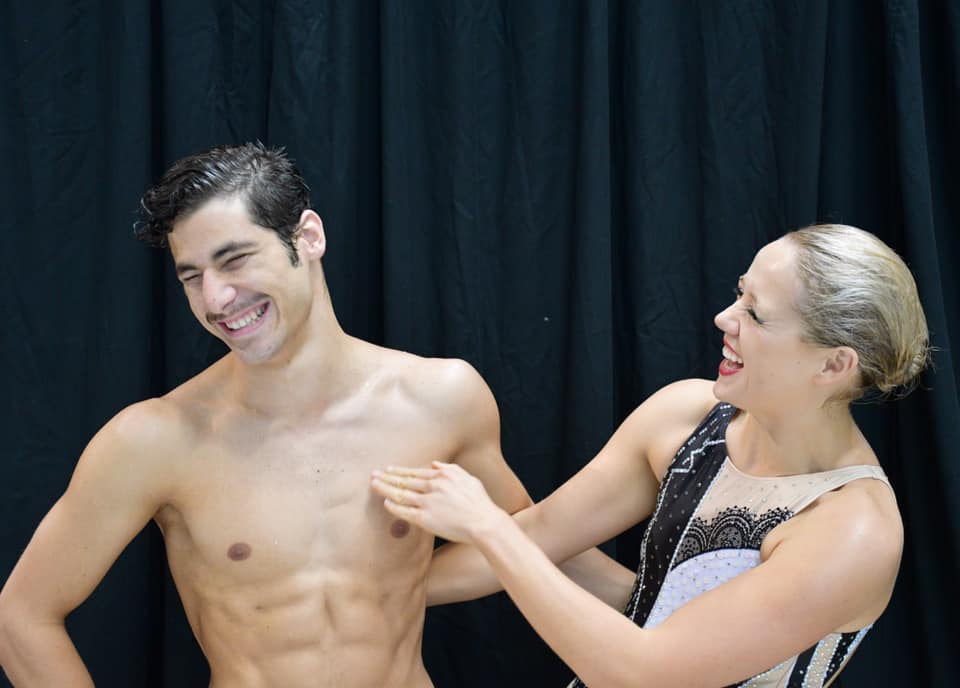
Calleja and Kettlewell just competed at the Australia Open where they won gold. They will next compete at the China Open in May, before moving on to the FINA World Championships in Gwangju, South Korea, in July. The two are only swimming in the free routine event this year, and they are very eager to show the world their “Bonnie & Clyde” routine, where they bring in a 1930s twist to the classic tale.
Thank you for taking the time to chat with me, and good luck for the rest of the season!
Article by Christina Marmet
Cover photo by David Swift.

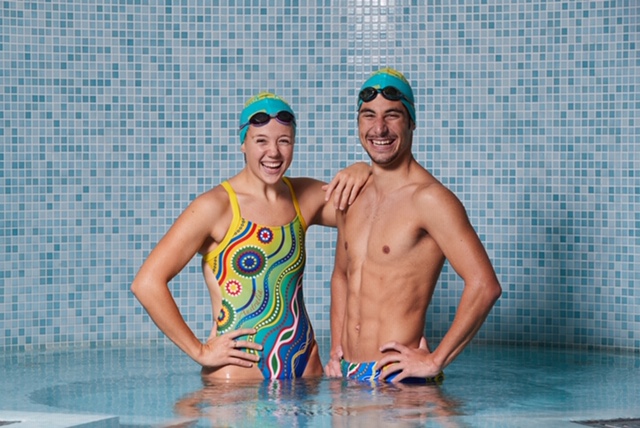
[…] you’ve read our interview with Calleja and Kettlewell from a few weeks ago, you already know Calleja only has a little over […]